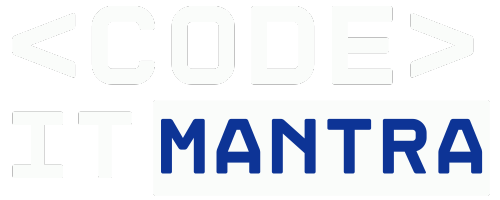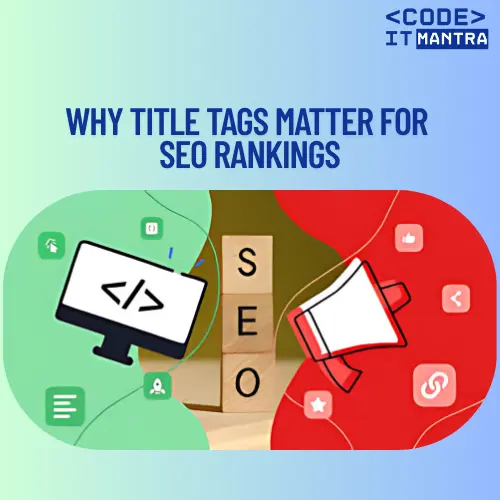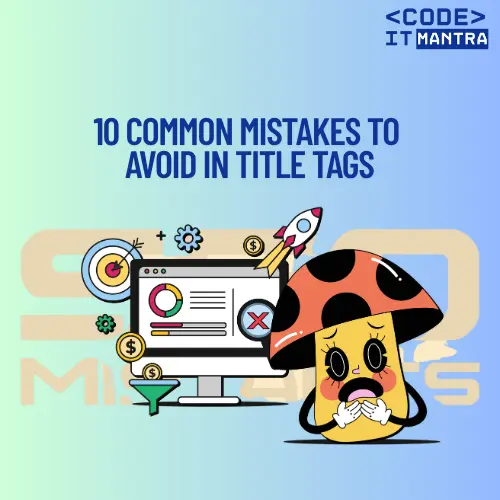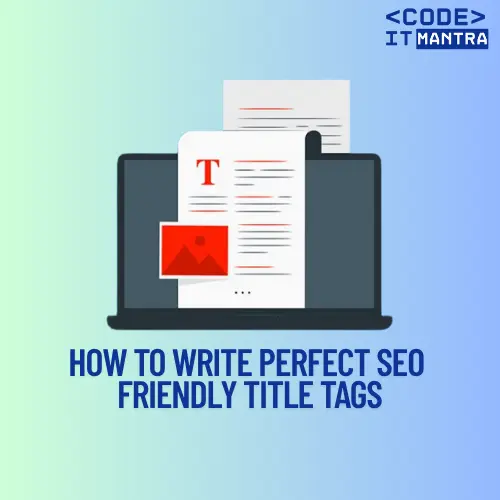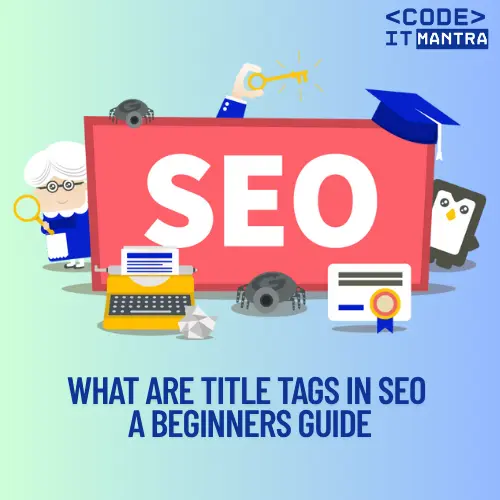Why Title Tags Matter for SEO Rankings
Table of Contents

What Are Title Tags in SEO?
Title tags are one of the most important elements in search engine optimization or SEO. They are small pieces of text in the HTML code that describe the title of a web page. These tags help both search engines & users understand what the page is about. A clear & well-written title tag can improve your website ranking & attract more visitors.
1. What Is a Title Tag?
A title tag is an HTML element that defines the title of a web page. This is placed inside the <head> section of a website code. This tag shows up as the clickable headline in search engine results browser tabs & social media previews. Because it appears in these important places writing a good title tag is essential for SEO success.
<title>Best Online Learning Platforms for 2025</title>
2. Why Are Title Tags Important in SEO?
Title tags are important because they tell search engines what your page is about. Google uses title tags to help decide how relevant your page is to a user search. If your title tag matches the search query well your page is more likely to appear higher in the results. A well-written title also strengthen people to click on your link.
3. Where Do Title Tags Appear?
Title tags appear in three main places: search engine results pages (SERPs) browser tabs & when your page link is shared on social media. In SERPs the title tag is the blue clickable link users see. In browser tabs it helps users identify which pages they have open. On social media it often appears as the headline of the shared link.
4. How to Write Effective Title Tags
Writing an effective title tag means making it clear concise & relevant to your content. Keep the title between 50 & 60 characters so it does not get cut off in search results. Use important keywords near the beginning but avoid keyword stuffing. Also try to make it interesting so people want to click on it.
- Include your main keyword early in the title for better SEO.
- Keep the title length between 50 to 60 characters.
- Make sure each page on your website has a unique title tag.
5. Common Mistakes to Avoid with Title Tags
Many websites make mistakes like using the same title tag on multiple pages or writing titles that are too long or vague. These errors hurt your SEO because search engines cannot understand which page is more relevant. Avoid generic titles like "Home" or "Page 1" & never stuff your titles with repeated keywords.
6. Examples of Good & Bad Title Tags
Here is an example of a bad title tag: "Home." It tells nothing about the page & is not helpful for SEO. A better title would be: "Affordable Running Shoes for Men | SportStore." This title is clear contains keywords & invites users to click. Always aim for titles that describe the page content accurately.
<title>Home</title> < -- Bad example -->
<title>Affordable Running Shoes for Men | SportStore</title> < -- Good example -->
7. Using Title Tags to Improve Click-Through Rates
Besides ranking title tags also impact how many people click on your website in search results. A catchy & relevant title can increase your click-through rate. You can use words like "Guide" "Tips" or "Best" to make titles more attractive. Testing different title tags over time helps you find what works best for your audience.
Conclusion
Title tags may seem simple but they play a huge role in SEO. They help search engines understand your content & encourage users to visit your website. Writing unique clear & keyword-focused title tags can improve your ranking & traffic. Always avoid common mistakes & focus on creating titles that match the page content & attract clicks.

Why Title Tags Are Important for Search Rankings
Title tags are one of the most important factors that affect search engine rankings. They help search engines understand the content of a webpage & decide how relevant this is to a user search query. Well-crafted title tags improve visibility attract more clicks & increase organic traffic to your website. This makes them essential for any SEO strategy.
What is a Title Tag?
A title tag is a small piece of HTML code that defines the title of a webpage. It appears in the browser tab & search engine results. For example the title tag for a page about SEO tips might look like this: <title>Best SEO Tips for Beginners</title>. It tells both users & search engines what the page is about.
How Title Tags Impact Search Rankings
-
Helps Search Engines Understand Content: Search engines use title tags to quickly hold the topic of a page. A relevant title with the right keywords helps improve your chances of ranking higher for related searches.
-
Improves Click-Through Rates (CTR): When a title tag is clear & matches the user intent people are more likely to click on your link in the search results. Higher CTR sends positive signals to search engines which can boost rankings.
-
Sets User Expectations: A good title tag lets users know what to expect on the page reducing bounce rates & increasing time spent on your website. This user behavior can indirectly improve search rankings.
-
Supports Keyword Targeting: Including important keywords in your title tags helps search engines associate your page with those search terms. But keyword stuffing should be avoided to keep the title natural & readable.
Best Practices for Writing Title Tags
-
Keep Titles Under 60 Characters: Google typically displays only the first 50 to 60 characters of a title tag. Keeping titles concise ensures your full message is visible to users.
-
Place Important Keywords Early: Put the most important keywords near the beginning of the title tag to improve relevance & search engine understanding.
-
Make Titles Clear & Descriptive: Titles should clearly describe the content of the page helping both search engines & users know exactly what to expect.
-
Use Branding When Appropriate: Adding your brand name at the end of a title can build trust & improve click rates primary for well-known brands.
-
Avoid Duplicate Titles: Each page on your website should have a unique title tag to prevent confusion for search engines & users.
Example of a Well-Optimized Title Tag
Here is an example of a well-optimized title tag: <title>Easy SEO Tips for Beginners | YourBrand</title>. This title includes keywords early is under 60 characters & adds a brand name at the end to build trust.
Common Mistakes to Avoid
-
Using Too Many Keywords: Keyword stuffing makes titles hard to read & can lead to penalties from search engines.
-
Ignoring Title Tags: Pages without title tags lose ranking opportunities & can confuse both users & search engines.
-
Overly Long Titles: Titles that are too long get cut off in search results which can reduce their impact & clarity.
-
Duplicate Titles Across Pages: Duplicate titles reduce SEO effectiveness & can make it hard for search engines to index pages properly.
How to Edit Title Tags
You can add or edit title tags directly in the HTML code using the <title> element inside the <head> section. For example:
<title>Your Page Title Here</title>
If you use content management systems like WordPress SEO plugins such as Yoast SEO or Rank Math make it easy to update title tags without coding knowledge.
Conclusion
Title tags play a critical role in search rankings because they help search engines understand your content improve click-through rates & set user expectations. Writing clear unique & keyword-rich title tags following best practices is essential to boost your website visibility & attract more visitors.

How Google Uses Title Tags to Rank Pages
Title tags are quite important for SEO because Google uses them to understand what a webpage is about. The title tag appears on search results & browser tabs giving both users & search engines a quick summary of the page content. Google pays close attention to title tags when deciding how to rank pages for different search queries. Knowing how Google uses title tags can help you improve your website ranking & attract more visitors.
1. Title Tags Help Google Understand Page Content
Google algorithms scan title tags first to determine the main topic of a webpage. A clear & relevant title tag tells Google exactly what your page is about. For example if your page is about baking chocolate cakes a title like Easy Chocolate Cake Recipes for Beginners clearly explains the page focus. This helps Google match your page with people searches more accurately improving your chances of ranking well.
2. Keywords in Title Tags Affect Ranking
Google looks for important keywords in title tags to rank pages higher for related searches. Including relevant keywords naturally in your title tag shows Google that your page contains useful information about those terms. For example a page targeting "best smartphones 2025" will rank better if the title tag contains those exact words. But stuffing too many keywords can harm your ranking so balance is key.
3. Title Tags Impact Click-Through Rate (CTR)
Besides ranking Google also uses the title tag to show results in search listings. A well-written title tag attracts more clicks from users. If your title is clear interesting & matches user intent people are more likely to click on your link. Higher CTR can also improve your ranking because Google sees your page as more relevant & valuable to searchers.
4. Google May Rewrite Title Tags
Sometimes Google changes the title tag shown in search results if it thinks the original title is not clear or relevant enough. This can happen if your title is too long stuffed with keywords or missing important details. To avoid this write concise meaningful title tags that explain your page well. For example avoid titles like Buy Cheap Cheap Cheap Shoes Online Sale which look spammy & may be rewritten by Google.
5. Unique Title Tags Help Google Distinguish Pages
Google prefers unique title tags for every page on your site. Duplicate titles make it harder for Google to tell pages apart which can lower their ranking. For example if you have multiple blog posts with the same title tag like Latest News Google might not rank them well. Instead create specific titles like Latest Tech News for June 2025 or Health Tips for Summer 2025.
6. Title Tags Should Match Page Content
Google checks if your title tag matches the actual content of the page. If the title promises one thing but the page delivers something else users will leave quickly. This increases bounce rates which can hurt your SEO. Always make sure your title tag accurately reflects your page content. For example if your title is How to Train for a Marathon the page should give useful marathon training tips.
Example of a Good Title Tag
<title>Best Yoga Poses for Beginners - HealthyLife Blog</title>
This title tag is clear includes important keywords like "Yoga Poses" & "Beginners" & ends with the brand name. This is concise & tells both Google & users exactly what the page is about. Such a title tag helps Google rank the page for yoga-related searches & strengthen clicks.
Summary of Key Points
- Google uses title tags to quickly understand the main topic of a webpage & decide its ranking.
- Including relevant keywords in title tags helps improve ranking but avoid keyword stuffing.
- A well-written title tag attracts more clicks which can positively affect rankings.
- Google may rewrite unclear or spammy titles in search results so write clear & relevant titles.
- Unique title tags for each page help Google distinguish between pages & rank them better.
- Title tags must accurately reflect the page content to avoid high bounce rates & penalties.
Understanding how Google uses title tags can help you write better titles that improve your website visibility & traffic. Always focus on clarity relevance & uniqueness to make your title tags effective for both users & search engines.

Title Tags & User Click Behavior
Title tags play a crucial role in influencing user click behavior on search engines. When someone searches for information the title tag is often the first thing they see. It acts like a headline that attracts their attention & helps them decide whether to visit the website or not. Understanding how title tags affect user clicks is quite important for website owners & SEO specialists.
Good title tags not only improve search engine rankings but also encourage users to click on your link instead of others. If a title is clear relevant & interesting users are more likely to visit the page. Then poor or misleading titles can make users avoid your website or leave quickly after clicking. This directly affects your site traffic & performance.
1. Clear & Relevant Titles Increase Clicks
Users want to find information quickly & easily. A clear & relevant title tag helps users understand what your page is about without confusion. For example a title like "Healthy Breakfast Recipes for Busy Mornings" clearly tells users they will find easy recipes to make breakfast. This kind of title matches the user search intent & strengthen clicks.
Solution: Write title tags that match the content of your page & the likely search terms users will use. Avoid vague or overly general titles. A precise title improves click rates because users immediately see the benefit of visiting your page.
2. Emotional & Action Words Boost User Interest
Adding emotional or action words in title tags can increase user curiosity & interest. Words like "easy" "best" "free" or "ultimate" create excitement & suggest value. For example "The Ultimate Guide to Saving Money Fast" sounds more appealing than just "Guide to Saving Money." Emotional words make titles more clickable.
Solution: Use positive & action-oriented words that encourage users to click. Think about what feelings or benefits your audience wants. For example "Easy Ways to Improve Your Writing Skills" motivates users to learn with less effort.
3. Avoid Misleading Titles to Keep User Trust
Sometimes websites use clickbait or misleading titles to attract clicks. While this may get short-term traffic it harms your website in the long run. Users who feel tricked may leave quickly increasing bounce rates & reducing trust. For example a title saying "Lose 10 Pounds in 1 Day" is unrealistic & disappoints visitors.
Solution: Always make sure your title tag honestly reflects the page content. Clear & truthful titles build trust & encourage users to stay longer on your site. This also helps search engines see your page as reliable & valuable.
4. Use Numbers & Lists for Better Engagement
Titles with numbers or lists often get higher clicks because they promise specific easy-to-digest information. For example "5 Simple Tips to Improve Your SEO" tells users they will find a short list of practical tips. This format makes the content seem more organized & less overwhelming.
Solution: Include numbers & list words in your title tags when relevant. This signals clear structure & value to users increasing the chance they will click & read the content.
5. Keep Title Tags Within Optimal Length for Better Display
If title tags are too long search engines cut them off which can confuse users & reduce clicks. Users may not see the full message & lose interest. For example a quite long title might end with "..." hiding important details. This reduces the attractiveness of the title.
Solution: Keep your title tags under 60 characters. This ensures the full title appears in search results providing users with complete information & improving click-through rates.
Code Example: A Well-Optimized Title Tag
<title>7 Easy Tips to Boost Your Website Traffic Quickly</title>
This example uses a number action words like "easy" & "quickly" & is clear & concise. This aims to attract users looking for simple ways to increase website visitors.
Summary: How Title Tags Impact User Click Behavior
- Be clear & relevant: Write titles that accurately describe your page content & match user searches.
- Use emotional words: Add words that create interest & excitement to encourage clicks.
- Avoid misleading titles: Keep user trust by ensuring titles match the real content.
- Include numbers & lists: Make titles more attractive & easier to understand with lists or numbers.
- Keep titles short: Under 60 characters to avoid cutting off important information.
By focusing on these points you can create title tags that not only improve your search rankings but also encourage more users to click on your website. Good title tags improve user experience increase traffic & help your site succeed online.

Real SEO Examples Showing Title Tag Impact
The title tag is a key part of SEO that directly affects how your webpage ranks & how many users click on your link in search results. Many real-life examples show how improving or changing the title tag can lead to better rankings & more visitors. In this article we will explain with simple examples how the title tag impacts SEO & share solutions to use it well for your website.
1. Example of Keyword Optimization in Title Tags
Imagine a website selling handmade candles. At first their title tag was simply "Home." This was too vague & did not help in search rankings. After changing it to "Handmade Scented Candles – Natural & Long Lasting" their site started appearing higher in searches for candles. This shows how including important keywords in the title tag makes a big difference.
2. How Title Length Affects Clicks
One company had a long title tag like "Best Affordable Running Shoes for Men & Women in 2025 – Shop Now at BrandName Online Store." Because it was too long Google cut it off in search results making it look messy & unclear. After shortening it to "Best Affordable Running Shoes 2025 | BrandName" they saw an increase in clicks. Keeping titles concise helps users quickly understand your page.
3. Using Unique Titles for Different Pages
A blog about healthy recipes initially used the same title tag "Healthy Recipes" for all pages. This confused search engines & users. Changing each title to be unique like "Easy Healthy Breakfast Recipes" or "Quick Healthy Dinner Ideas" helped Google rank each page for specific searches. Unique titles improve SEO & guide users better.
4. Avoiding Keyword Stuffing in Titles
Another example comes from a tech store. They once used a title tag like "Laptops Laptops Sale Cheap Laptops Best Laptops." This keyword stuffing made the title look spammy & hurt their rankings. Rewriting it as "Best Cheap Laptops on Sale – Quality & Performance" made the title clear & attractive improving both SEO & user trust.
5. Including Brand Name Smartly
A fashion website tested two title tags: one with the brand name at the start & one at the end. Titles like "BrandName Winter Jackets Sale" had lower clicks compared to "Winter Jackets Sale | BrandName." Users preferred seeing the main product keywords first but still recognized the brand. Adding the brand at the end keeps the title balanced & SEO friendly.
6. Correct Placement of Title Tag in HTML
Sometimes websites forget to place the title tag inside the <head> section of the HTML. One example site fixed this by adding the title tag properly:
<head>
<title>Affordable Fitness Gear – Shop Now</title>
</head>
This simple fix helped search engines read the title correctly & improved the site visibility. Always ensure your title tag is in the right place in your HTML code.
7. Testing Titles with Tools
A travel blog used Google snippet preview tools to test different title tags before publishing. They changed a long title "Top 10 Best Places to Visit in Europe in 2025 for Families & Couples" to a shorter "Top 10 Best Places to Visit in Europe 2025." The tool showed that the shorter version fits well & looks better in search results. This testing helped them get more clicks.
Summary of Real SEO Title Tag Lessons
- Use relevant keywords: Titles with clear keywords rank better in search results.
- Keep titles concise: Avoid long titles to prevent them from being cut off.
- Create unique titles: Different titles for each page improve rankings & user clarity.
- Avoid keyword stuffing: Use keywords naturally to maintain trust & ranking.
- Place brand name smartly: Usually at the end to stress main content first.
- Correct HTML usage: Title tags must be inside the
<head>section. - Test titles before publishing: Use tools to preview how titles appear in search results.
These real examples prove that the title tag is not just a simple label but a powerful tool for SEO success. Applying these tips & learning from real cases can boost your website visibility increase traffic & improve user experience. Always pay attention to your title tags & keep optimizing for the best results.

Summary: Key Takeaways on Title Tag Importance
Title tags are one of the most important parts of a website SEO. They help search engines understand the content of a page & impact whether users click on your page in search results. Knowing the key points about title tags can help you create better titles that improve your website traffic & ranking.
What Are Title Tags?
Title tags are HTML elements that define the title of a webpage. They appear in the search engine results as clickable headlines & on browser tabs. A clear & well-written title tag tells both users & search engines what the page is about. This helps attract the right audience to your site & improve your search rankings.
Why Are Title Tags Important?
Title tags are important because they act like a first impression for your webpage. They help search engines understand your page topic which affects your ranking. For users a good title tag shows what they will find on the page encouraging them to click. Without a strong title tag your page may not get enough visitors even if the content is good.
Key Points to Remember About Title Tags
- Keep It Concise & Clear: Title tags should be brief but descriptive. Usually less than 60 characters work best because search engines cut off longer titles. Clear titles help users understand the page quickly.
- Include Important Keywords: Use keywords that relate to the main topic of the page. Keywords near the beginning of the title are more likely to catch attention from both search engines & users.
- Make Each Title Unique: Every page should have a different title tag. This avoids confusion for search engines & helps each page rank for its own topic.
- Write for Users Not Just Search Engines: Titles should sound natural & interesting. A title that attracts clicks can increase your website traffic & improve SEO.
- Avoid Keyword Stuffing: Do not overuse keywords in your title tag. This can make the title look spammy & harm your rankings.
Example of a Good Title Tag
For a page about healthy smoothie recipes a good title tag could be:
<title>Easy & Healthy Smoothie Recipes for Beginners</title>
This title is clear includes keywords like "healthy smoothie recipes" & is inviting to users who want simple recipes.
How Title Tags Affect SEO & User Experience
Title tags improve SEO by helping search engines categorize your content correctly. When your title matches what people search for your page has a better chance of ranking higher. Good titles also improve user experience by providing clear information before the user clicks leading to more relevant visitors & less bounce rate.
How to Check & Improve Your Title Tags
- Use SEO Tools: Tools like Google Search Console or third-party SEO tools help you see how your title tags perform. You can check CTR rankings & impressions to decide if you need to improve titles.
- Test Different Titles: Try changing title tags & monitor the results. A small change in wording can sometimes increase clicks greatly.
- Follow Best Practices: Always write titles that match the page content & avoid using the same title for multiple pages.
Conclusion
Title tags are simple but powerful tools to boost your website SEO & attract the right visitors. By keeping titles clear keyword-focused unique & user-friendly you can improve your website visibility & traffic. Regularly review & update your title tags to keep your site performing well in search engines.

